
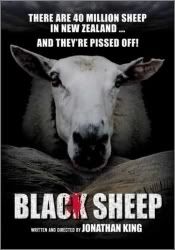 Voilà un film que certains festivaliers toujours prêts à faire un peu de chemin ont eu l'occasion et la chance de découvrir en 2007 et pour lequel nous ressentons une tendresse non négligeable. Cette comédie horrifique donnant la vedette à de teigneux moutons mangeurs d'hommes signée du Néo-zélandais Jonathan King (présentant là son premier long métrage) ayant à présent terminé sa tournée de festivals débarque enfin en salles la semaine prochaine.
Voilà un film que certains festivaliers toujours prêts à faire un peu de chemin ont eu l'occasion et la chance de découvrir en 2007 et pour lequel nous ressentons une tendresse non négligeable. Cette comédie horrifique donnant la vedette à de teigneux moutons mangeurs d'hommes signée du Néo-zélandais Jonathan King (présentant là son premier long métrage) ayant à présent terminé sa tournée de festivals débarque enfin en salles la semaine prochaine.
Pour nous avoir bien détendu et bien fait bien rire lors de l'édition 2007 du festival Fantastic' Arts de Gérardmer, nous tenions à le rajouter à la programmation Horreur c'est Vendredi ! de cette année (eh oui, une Saison III s'annonçant prometteuse) en vue de vous le proposer en avant première ce vendredi 14 Mars au Star Saint-Exupéry et naturellement en V.O.S.T. ! "Bloody animals!..."


A noter la participation des fameux studios Weta Workshop à la réalisation de Black Sheep sans oublier les récompenses décrochées par ce film attachant & divertissant lors de sa tournée en festivals avant son exploitation comme les Prix du Jury & Prix du Public à Gérardmer ainsi qu'un Corbeau d'Argent au B.I.F.F.F. de Bruxelles '07.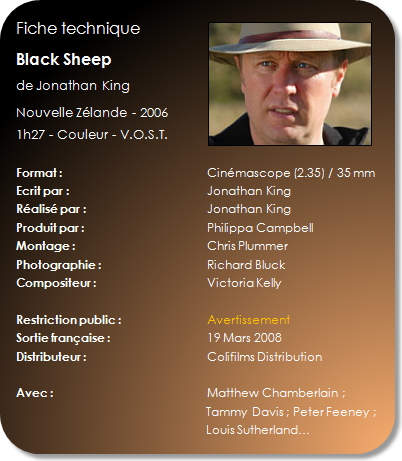
Alors en attendant ce vendredi, surtout pour les personnes désireuses de découvrir ce délire musclé, voici le fort chouette trailer du film (ayant pour source le Site Dave's Trailer Page) dont on nous ne nous lassons pas (^^) et on vous donne donc rdv en salle. Pure comédie oblige, soyez armés de bonne humeur & de vos meilleurs seconds degrés !





Hot News : Mars 2008
Vidéos
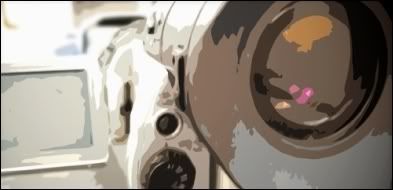
Bien que certaines soient encore en atelier de (re)montage, au sein de cette petite rubrique se retrouvent & se retrouveront mises en lignes toutes les vidéos concernant nos éditions de festivals. Les bandes-annonces de Mahon ; soirées d'ouvertures ; rencontres ; coulisses ; moments impayables ; soirées de clôtures, reportages et bien d'autres petits délices en perspectives... à consommer sans modération.
A l'instar des photos, les vidéos permettent fréquemment de joliment faire resurgir d'excellents souvenirs relatifs à d'inoubliables expériences vécues par le public & les invités aux côtés du Spectre et permettent par la même occasion de donner un fort sympathique aperçu des événementiels aux fantasticophiles ne s'étant encore jamais rendus à Strasbourg... Attention, on a les noms (^°) !... 
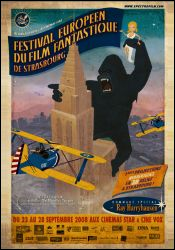 L'année dernière, pour notre première édition du Festival Européen du Film Fantastique de Strasbourg, les traits de la Spectre Island sortaient tout doucement de la brume et se profilaient enfin à l'horizon par le biais de cette bande-annnonce. Trailer, tout comme celui de 2006 (voir plus bas) et celui de 2009 (arrivant bientôt), dessiné & réalisé par Mahon aux côtés du talentueux Mathieu Pelletier pour la musique & le son.
L'année dernière, pour notre première édition du Festival Européen du Film Fantastique de Strasbourg, les traits de la Spectre Island sortaient tout doucement de la brume et se profilaient enfin à l'horizon par le biais de cette bande-annnonce. Trailer, tout comme celui de 2006 (voir plus bas) et celui de 2009 (arrivant bientôt), dessiné & réalisé par Mahon aux côtés du talentueux Mathieu Pelletier pour la musique & le son.
Parallèlement à la version numérique dédiée au Web, cette vidéo, toujours autant Vintage, a à nouveau très brillamment été réadaptée au format 35 mm par Eclair et ses réputés laboratoires pour les salles des cinémas Star. Les soucoupes, Sinbad, le Cyclope, un sorcier, King Kong, Jason & ses squelettes... que de beaux protagonistes à l'image de la rétrospective 2008 du Spectre ayant principalement rendu hommage à l'énormissime Ray Harryhausen !... 

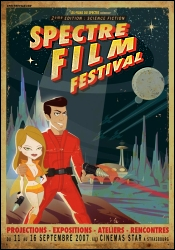 En attendant d'autres vidéos comme le clip présentant cette 2nde édition, voilà un mini reportage signé France 3 Alsace consacré au Spectre Film Festival 2007. Ce reportage, tourné en plein festival pour l'émission 19|20 du 14 Septembre, proposait donc aux strasbourgeois une présentation de l'événement pour le week end, présentation incluant une courte partie de l'interview de notre invité d'honneur Luigi Cozzi répondant à ce moment-là aux questions posées par la chaîne au CAUE du Bas-Rhin.
En attendant d'autres vidéos comme le clip présentant cette 2nde édition, voilà un mini reportage signé France 3 Alsace consacré au Spectre Film Festival 2007. Ce reportage, tourné en plein festival pour l'émission 19|20 du 14 Septembre, proposait donc aux strasbourgeois une présentation de l'événement pour le week end, présentation incluant une courte partie de l'interview de notre invité d'honneur Luigi Cozzi répondant à ce moment-là aux questions posées par la chaîne au CAUE du Bas-Rhin.
La qualité de cette vidéo (source : le Site de France 3 Alsace) ne devrait être que provisoire et nous faisons en sorte à être en mesure de vous proposer une qualité nettement supérieure dans les prochains temps. Peu-être la chaîne aura-t-elle la courtoisie de nous remettre une p'tite copie d'origine (^°)... Croisons les doigts (^^) !

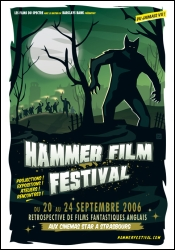 Eh bien oui, comme promis, nous commençons enfin à garnir nos rubriques médias et donc à vous les proposer sur ce Blog. En plus d'un arrivage en ligne de nombreuses photos voici le trailer du Hammer Film Festival 2006. Trailer réalisé par Mahon et Mathieu Pelletier adapté au format pellicule 35 mm (par les prestigieux laboratoires Eclair) donc non seulement projetée à l'ouverture du festival mais également lors de plusieurs séances.
Eh bien oui, comme promis, nous commençons enfin à garnir nos rubriques médias et donc à vous les proposer sur ce Blog. En plus d'un arrivage en ligne de nombreuses photos voici le trailer du Hammer Film Festival 2006. Trailer réalisé par Mahon et Mathieu Pelletier adapté au format pellicule 35 mm (par les prestigieux laboratoires Eclair) donc non seulement projetée à l'ouverture du festival mais également lors de plusieurs séances.
Si vous souhaitez en savoir davantage sur le talent de Mahon, eh bien nous vous invitons alors à jeter un clic sur le Site du Smooth Hustler offrant un bel aperçu de ses activités artistiques. Design, illustrations, logos, travaux d'écritures, animation, vêtements & goodies pour les Troupes de l'Undaground nommées Macia (etc) : un univers pertinent & décalé ayant déjà de nombreux adeptes ! Bonnes visites (^°) ! 

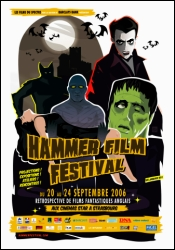 Après ce beau trailer, voici la seconde vidéo : la présentation de notre tout premier festival, vidéo offrant un aperçu des prestations du Spectre lors de cette édition initiale ainsi qu'un condensé de beaux moments passés aux côtés de nos invités et des festivaliers durant cette inoubliable semaine de festivités joliment teintées d'hémoglobine. Une charmante vidéo réalisée par ces non-moins charmantes Mel & Manue ayant bossé avec la précieuse participation de Mahon pour le très bel habillage.
Après ce beau trailer, voici la seconde vidéo : la présentation de notre tout premier festival, vidéo offrant un aperçu des prestations du Spectre lors de cette édition initiale ainsi qu'un condensé de beaux moments passés aux côtés de nos invités et des festivaliers durant cette inoubliable semaine de festivités joliment teintées d'hémoglobine. Une charmante vidéo réalisée par ces non-moins charmantes Mel & Manue ayant bossé avec la précieuse participation de Mahon pour le très bel habillage.
Un condensé donc pour l'heure car précédant d'autres vidéos à venir qui présenteront davantage (entre autres événements) les conférences, les rencontres à la FNAC, au CAUE ou encore à l'université Marc Bloch de Strasbourg en présence du grand Jimmy Sangster et les invités nommés Michel Cieutat ; Alain Pozzuoli ; Jean-Pierre Berthome & Jean Alessandrini. 
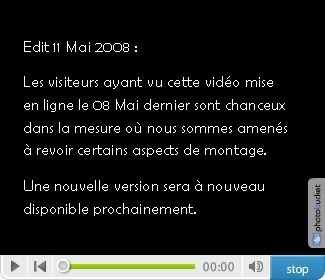
 Rubrique en construction...
Rubrique en construction...
Interviews

Durant les événementiels organisés, nous avons, tout comme le public, la chance et l'honneur de rencontrer différentes personnalités faisant partie intégrante de la famille du cinéma. Le Spectre est désireux de vous faire partager les moments passés en leur compagnie lors d'interviews que tous ces invités ont eu la courtoisie de nous accorder.
Qu'ils soient retranscrits, enregistrés sous forme audio et/ou vidéo, tous les échanges (avec ces scénaristes, comédiens ou bien évidemment metteurs en scènes) richissimes en anecdotes au sujet de productions, d'écritures & de tournages finiront au fur et à mesure dispo's ici.

















 Traductions en cours / Rubrique en construct°...
Traductions en cours / Rubrique en construct°...
Entretien avec Luigi Cozzi

Spectre Films: The 2nd Spectre Film Festival ends today, and part of its success can be attributed to you. We invited you here to present your film Star Crash but because of your vast knowledge of and enthusiasm for science fiction literature and cinema you ended up presenting and commenting on the Godzilla films and those by Jack Arnold. And just generally enlivening things up! Can you trace the origins of your interest in science fiction literature and films for us?
Luigi Cozzi: Well, it is a long story which goes back to my childhood. When I was a kid in the 50s, the last century you know, in Milan, Italy, I was always interested in science fiction movies. Those were very different times: there was no TV and the only place to see a picture was in a movie theatre. And because I was very young I had to go with my parents.
At that time sci-fi was considered worse than the comic books, very close to pornography even, so my parents did not want me to see them. They told me they sci-fi movies were made for stupid people. It was also very difficult to see a sci-fi movie in those times because they did not make money at the box office. In my home town they were shown only during the summer when everyone was at the seaside. The Creature of the Black Lagoon would play for two days and if wanted to see it you had to go immediately, otherwise it would be gone. I spent most of my childhood going to incredibly low and dirty little cinemas to see those pictures. But I loved them. I really loved them.
In fact, it is true that most of those pictures were stupid, even to a kid. So I began to think about it and decided that I myself could make better movies than those. I started to dream of becoming a science fiction director one day. I wanted to see as many sci-fi movies as possible and during those years I saw every movie, I went to every festival and every sci-fi convention. I even saw science fiction from Indian and from the Philippines, because I love them all.
Spectre: What about sci-fi literature? A lot of your films have their origin in it, which as you pointed out at the festival was considered second rate literature many years ago. Even writers who are considered excellent today were shunned by many in the past.
LC: Most classic science fiction was published in the pulps. They were sold only at newsstands. They came out every month with nude girls on the cover and huge monsters wanting to get the girls. Inside these magazines there would be one beautiful story and four or five horrible ones. When I started to be a fan of sci-fi movies because there were so few in my country I turned to the newsstands to find something I liked. There I found sci-fi magazines with wonderful covers, colourful colours, covers with spaceships, with girls and stars and things like that. So I started reading and became a sci-fi addict. When I started to make my 8mm home movies …
Spectre: How old were you then?
At that time, about 15. I started filming when my mother gave me very small Kodak 8 mm camera for Christmas which worked with a handle. I had to move it manually to run the film. It only lasted for two minutes. And then I had to wait two weeks to get it back from the lab. Two weeks for two minutes. So that is how my filmmaking started. And that is the way it was in those years for kids.
Spectre: So you found your calling early. Did you ever see yourself as going into another profession?
LC: No, I always wanted to be in science fiction and I have always been.
Spectre: Let’s talk about your first film The Tunnel under the World, which you made in 1969 when you were 22 years old. I am blown over by this film in more ways than one. It is radically different from your other films such as Star Crash and Hercules, where you deal with polarised worlds of good and evil and where there is no real character development because the characters are one-dimensional comic strip types. The Tunnel under the World is quite a dark picture and it is very ambiguous. It’s much closer to David Lynch than to Star Wars. I have the feeling it is a very personal film.
LC: The Tunnel is a picture I made in full freedom because it was made outside the realm of commercial cinema. So I had no one to lie to, and I did only what I wanted. The only limit was money, which we did not have much of. So I had to be inventive and do shots that didn’t cost anything. When you are making pictures in a commercial system, you may have money, even big money for shots, but you must give something for it – you must give an end, a beginning, a middle, you must give a hero, otherwise they won let you make pictures. It’s a very different concept of film making. The Tunnel under the World was made in the year of Jean-Luc Godard, and the British free cinema, the so-called New Wave.
Spectre: That reminds me, there is a character in the film that looks like Godard. Was that intentional? He has the same haircut, big glasses and a coat of the same type that Godard wore. If you look at photos of Godard during this period, the resemblance is quite striking.
LC: Yes, but it was not supposed to be Godard. The guy really looked that in real life. I chose him because he was a perfect non-looking man.
Spectre: A non-looking man?
LC: He didn’t look like anything.
Spectre: A nondescript type of man. I see, but in fact he looks like Godard.
I found the film very pessimistic. The world is vanishing and people cannot hold on to it.
LC: The picture was adapted in spirit but not in fact from an American science fiction piece published in 1954 by Frederik Pohl. It’s a story about the vanishing of the whole the world. A man who gets up every morning, goes to work, makes money – he’s a perfect middle man. He notices that everyday there is new advertising for new products everywhere. And at a certain point, he discovers that he and everyone else are being used to test ad campaigns. I tried to do a paradoxical thing, and show a world vanishing and a new strange thing taking over.
Spectre: It is very effective. I haven’t read the original story, but one is struck by the presence of advertising throughout the film which is not related directly to the story. The music is also very effective in creating several moods.
LC: I have always paid a lot of attention to music in film, because I love music, in fact I am a music addict and I consider it to be a basic element of the movies.
Spectre: There is something else that is interesting, and very pessimistic and funny at the same time. That is the computer who talks about how he takes care of people both individually and collectively and wants to do better than God does, but at the same time he acknowledges that he is the will of God. Does this idea come from Pohl story?
LC: No. I picked up things from other writers such as Ray Bradbury. There is a tiny bit of the The Martian Chronicles in the film and a tiny bit of Ballard, and the computer you mention was inspired by 2001 – A Space Odyssey. 2001 was made one year before, but the computer in it is quite different. You can also find something similar in a very interesting story called An Unwise Child by the American writer Randall Garrell.
Spectre: Another part that I liked very much was the young man who speaks with a woman’s voice.
LC: That’s me.
Spectre: Was it? I knew you were in the film, but I wasn’t sure I had spotted you. Why did you use the woman’s voice? It heightens the already disturbing and anguishing side of the film.
LC: I used it because I had no intention of acting in the film. But they guy who was supposed to play that part didn’t show that morning, so I had to do it. But I didn’t like myself on screen, and I wanted to do something disturbing, so I put a female voice on that character.
Spectre: It worked very well. The film is not dated, which is unusual because that is often the problem with small experimental films such as this one. They work for maybe 5 or 6 years, and then new contexts come in and things change, and they don’t work anymore. That is another reason I was so surprised by the film – you could have made yesterday.
LC: Thank you for the compliment. I am happy you think that.
Spectre: When talking about The Tunnel on the bonus of the newly released DVD of Contamination (aka Toxic Spawn), you say that many of the film’s special effects were due to a lack of money. If could make this film again today with all the money you wanted what would you change?
LC: Well, it has already been remade in Hollywood. It was remade as The Truman Show. They stole the core of Frederik Pohl’s story But now they want to remake it again in Hollywood, which is a few months ago why Frederik Pohl’s agents sent me an 80-page contract to sign. It stipulated that I would do nothing to disturb the release of the forthcoming new version of The Tunnel, by re-releasing the oldest version – my version – on the American market. But now it has just been released in France.
Spectre: But if you were to make it again, what would you do?
LC: If I were making it again, it would be inside of a commercial system. It would be very different in that it would have a middle, an end, a beginning, a story. I would stick much more to the core of the Frederik Pohl story which is very beautiful in my opinion. And I would make a very expensive big movie.
Spectre: Are you nostalgic for the period when you had no constraints on you?
LC: You are always nostalgic for freedom. I would like to do something in that style again, but completely different because I am completely different today, but with the same complete freedom I had in the past.
Spectre: What happened to this film after you made it? Was it shown in many theatres?
LC: It was shown in a limited number of theatres, such as art houses and it went to festivals. It got good reviews.
Spectre: In Italy?
LC: Yes, in Italy.
Spectre: How did it come to be re-released with Contamination?
LC: When the French told me that they were doing a DVD of Contamination I thought that it would be a good opportunity to let The Tunnel go around the world, so I gave them the rights for free. The film has never been seen outside of Italy until now.
Spectre: Well, I think that was a very good idea because it reveals a side of Luigi Cozzi that we don’t know very well.
LC: Yes, people always think I am a spaceship filmmaker, and I am. But I also do different things.
Spectre: What are the sci-fi directors and films that you have a special affection for?
LC: The list would be a long one, because I like even the bad ones. To me the most perfect sci-fi film ever made is 2001 A Space Odyssey, both technically and artistically. But that is serious science fiction. There are also many low budget, even stupid sci-fi films which I love because there are full of a sense of wonder. They are stupid, they are badly done, but there is something in them that makes me like them very much.
Spectre: I agree, sometimes B films, even bad Bs are our favourites. Outside sci-fi and fantastic, who are the directors you admire the most.
LC: I like classical cinema. The director I hold in the highest esteem is Stanley Kubrick, but he is too intellectual sometimes; so the one I really prefer is John Ford. He could do any kind of movie – drama, comedy, war pictures, and they all worked. I also like Howard Hawks and of course Alfred Hitchcock. These directors have been the main inspiration for my work and these are the directors I think the most of. In French cinema, I like François Truffaut.
Spectre: Two more questions: could you tell us a bit about you recently published book on Jack Arnold, the approach you used and so forth.
LC: I have written more than 20 books on cinema. I also write about other things; My books about cinema are mostly historical essays more than mere criticism because one of the most important things for me to be clear and easy to understand. I resent it when I read a book that is hard to follow. I dislike books that over-interpret things because I know very well as a filmmaker myself that sometimes when you do something there is no meaning to it. You just do it for practical reasons, and then along comes someone who will write 300 pages about why this was done or why that was done. This is something I try to avoid.
So when I wrote my book on Jack Arnold, actually it was also about William Alland and all of the Universal sci-fi movies of the 1950s, I first tried to explain what Universal was at that period. People should know that at the beginning of the 1950s Universal was on the verge of bankruptcy, so they went back to doing low-budget movies with terrific, colossal, colourful and spectacular posters. Posters which were used to draw huge audiences to the theatres to see those small, small, minor “B” sci-fi movies. Also Universal functioned as a studio, meaning that they had people on fixed salaries. If Universal made a picture with them, they did not get a dime more than their weekly salary. If you were a producer, and didn’t produce anything, you were still paid. William Alland did not like that – he wanted to work.
I also explained who Jack Arnold was. He was a dancer and actor. He came to Universal to teach young actors how to dance. People had a job to do at Universal, and sometimes they were selected to do a movie, but their salary stayed the same. In Arnold’s science fiction films, only Richard Carson came from the outside, and that was an extra expense.
Spectre: You have a quite well-known book shop in Rome. You also sell cinema related merchandise such as figurines, posters and so forth, and you have the Masters of Horrors museum with Dario Argento, to whom you work as a consultant. Do you have any projects to go back to filmmaking?
LC: I don’t think so. The commercial situation has changed. In Italy, there are almost no horror films being produced, and anyway I am not so fond of horror films. I love science fiction and none is being done by Italians today. They think it is too expensive and they can get sci-fi pictures cheaper and ready made from America. So it would be very difficult to make sci-fi films in Italy today. I prefer to stay in the shop and work with publishing houses and write books about the pictures, directors and producers that I love.
Spectre: Is there anything else you would like to talk about that I have not mentioned? I purposely avoided asking you questions about Star Crash and Hercules, because the Web is full of your interviews about these films. And I wanted to focus on The Tunnel under the World because it is my favourite. I couldn’t resist.
LC: There is nothing to say and a lot of things to say. I am happy that people are starting to watch The Tunnel. It is an interesting film. You either like it or dislike it, but you will have a reaction to it and this is a good thing for a movie that was made 50 years ago.
Butterfly Woo Dip. Traduction interview en cours...
Traduction interview en cours...

















